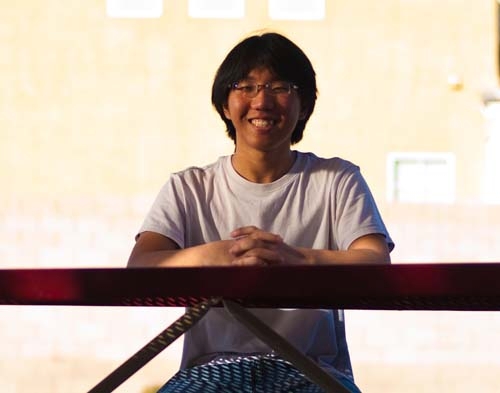National Merit semifinalist at Coronado not ready to decide on career path

Nok Hun Kim is an anomaly.
Unlike many in his elite group of peers who scored in the top 1 percent nationally on their PSATs, he doesn’t have his sights set on reaching a lofty ledge.
Doctor, engineer, neurologist, astrophysicist or mathematician.
He doesn’t know. He’s drifting.
The 18-year-old National Merit semifinalist is thinking about his future, which others predict will be blindingly bright. But he’s also looking back, recalling the hopes he had in fourth grade.
“I wish I’d made more friends,” he said when asked if he’s excited to graduate. “Make a lot of friends. That’s something I wished as a little kid.”
At age 10, he moved to Las Vegas from South Korea’s mega-capital city of Seoul, home to 10 million people. He came with his mother, older brother and father, who was temporarily transferred here to plan the Fremont Street Experience light canopy. Korean conglomerate titan LG sent his father, Eui Chul Kim, back to Korea after the project finished.
However, his wife, Yeong Sug Kang, stayed in Las Vegas with the couple’s sons. The separation has been hard for the family, said Kang, who spoke no English when she moved here and now sees her husband just twice a year. But the sacrifice was made for the health of the children, both of whom suffered from sinus and asthma problems in Seoul’s polluted air.
The relocation imposed a new challenge on the admittedly shy Nok Hun – fitting in with his American peers and learning a new language.
He picked up English in class.
“I just stayed quiet and observed them,” said the senior at Coronado High School in Henderson who chooses not to describe himself as Korean or American. “I feel like I’m not this or that.”
Few people know he was born in Korea and moved here, he said mentioning how he has always purposely worn “American kid clothes.”
“In order to fit in with the kids here, it’s important to conform,” said the slightly shaggy-haired teen, dressed in distressed jeans and a zip-up sweater.
Despite his efforts to blend in, his intelligence makes him stand out, something he’s reticent to admit. He doesn’t even know his GPA off the top of his head.
“It’s 3.3, I think,” he said. “Can’t really say for sure.”
He’s keen on learning, not grades, and reads often in his free time.
His attitude may have something to do with his parents, who don’t apply the pressure common in Korean culture to have children “study, study, study. No extracurricular activities,” said Nok Hun, adding that Korean parents often encourage children to enter the lucrative fields of medicine or law.
“I don’t think success relates to money,” said his mother. “And education is all knowledge, not just school education. It means everything we know.”
She wants Nok Hun to be wise and, more than anything else, happy. Defining happiness is up to him. For her, it meant abandoning her career in computer science to return to college to study nursing. It’s a journey she embarked on when she arrived in Las Vegas. She learned English as she went through nursing school.
Even though she doesn’t push Nok Hun down a specific career path, she did try to prepare him for whatever choice he makes by reading to him 30 minutes to an hour every night as a child. It’s something her parents never did. He now reads regularly, something she says is essential to success and intelligence.
She also enrolled him in “cram school” from freshman year through last year to prepare him for tests such as the SAT and ACT. He attended the school three to four times a week during the school year and five days a week during summers. Each daily session was about three hours. He didn’t see the value in it then but does now, he said.
Universities think highly of that top 1 percent of PSAT scorers deemed National Merit semifinalists.
The PSAT, co-sponsored by the College Board and National Merit Scholarship Corporation, is a standardized exam that measures critical reading skills, math problem-solving skills and writing skills.
Now Nok Hun just needs to choose a direction. For now, that’s probably psychology at either an American or South Korean university.
Why psychology?
“I need an ambition, to be something,” he said, noting that his own confusion has fueled a desire to study the human mind.
Contact reporter Trevon Milliard at
tmilliard@reviewjournal.com or 702-383-0279.